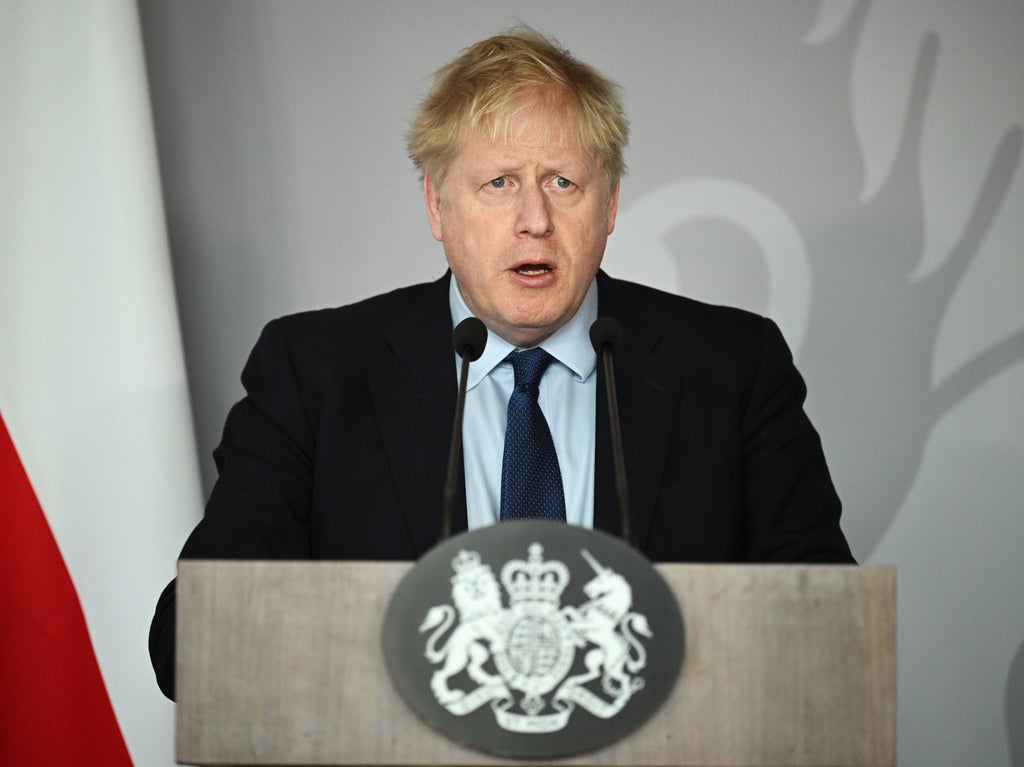
Boris Johnson said Britain would “welcome” a large number of Ukrainian refugees, as he bowed to pressure and expanded the visa criteria to allow more to join family members in the UK as they flee the war zone.
The government has come under pressure from both Tory and Labour MPs for its response to the refugee crisis, but the prime minister insisted the widened access would allow “very considerable numbers” of Ukrainians to seek refuge in the UK.
Mr Johnson claimed more 200,000 people from Ukraine could soon be eligible under the visa route, as the scheme was broadened to include more parents, adult children, grandparents and siblings.
He insisted Britain had “always had a tradition of welcoming people in large numbers” as he was grilled over his refusal to copy the EU by waiving visa rules for refugees fleeing Vladimir Putin’s forces.
Mr Johnson told reporters: “We’re extending the family [visa] scheme so that considerable numbers would be eligible. We’re talking about a couple of hundred thousand, maybe more.”
He added: “We’re going to have a humanitarian scheme, and then a scheme by which UK companies and citizens can sponsor individual Ukrainians to come to the UK. We’re doing exactly what the UNHCR [UN Refugee Agency] is asking us to do.”
The prime minister’s spokesperson said the 200,000 figure used by Mr Johnson was “indicative only” as it was “impossible to predict” how many would want to come to the UK.
The expansion of the Ukrainian visa scheme announced on Sunday was set to apply only to spouses, the parents of children under 18, as well as children under 18.
But Priti Patel confirmed in the Commons that the definition of relatives would be extended to “parents, grandparents, adult offspring, siblings” under the Ukrainian family visa scheme.
She also said a “humanitarian sponsorship pathway” was being set up for Ukrainians who do not have close family members in the UK, but who can get sponsorship from a firm or individual, saying there would be no limit of the numbers who could apply.
The home secretary told MPs both the family route and sponsorship route would allow Ukrainians to reside in the UK for an initial period of 12 months.
Ms Patel said: “This is a very generous and it is an expansive and unprecedented package. It will mean that the British public and the Ukrainian diaspora can support displaced Ukrainians in the UK.”
The home secretary defended her claim that the UK could not copy the EU by dropping visa requirements for refugees fleeing the Russian invasion because of “security advice”.
She told MPs: “Russian troops are seeking to infiltrate and merge with Ukrainian forces,” adding there are “extremists on the ground” in Ukraine.
Ms Patel also sparked anger by suggesting Labour MPs cannot be trusted to receive security briefings about threats to the UK from the crisis in Ukraine. “I’m very sceptical of how they treat and respect security advice.”
Jacqui Smith, former Labour home secretary, later tweeted: “That’s an unwarranted slur on the current opposition and unworthy of a home secretary.”
Shadow home secretary Yvette Cooper welcomed the changes announced on Tuesday, but questioned Ms Patel over whether more could still be done.
The senior Labour figure added: “Surely she is not expecting to turn their families away? When people are fleeing Russian authoritarianism or war I assume she will not be applying a test based on which bureaucratic box UK residents tick.”
Sir Keir Starmer said the government’s plans to relax visa rules for Ukrainians still do not go far enough. “A simple route to sanctuary is what we’re seeking,” the Labour leader told reporters on Tuesday. “I don’t think the Home Office and home secretary have gone far enough on this.”
Dozens of senior Conservatives had joined Labour in demanding more “decisive” action on refugees, including ex-ministers Jeremy Hunt, Robert Buckland, Greg Clark, Damian Green and Caroline Nokes.
Tory hardliner Sir Edward Leigh raised eyebrows by praising Ms Patel for refusing to drop visa requirements and “throw away the immigration rulebook”. He said his Lincolnshire constituents had already “done our bit in terms of migration from eastern Europe”.
The UK has also provided an extra £80m in funding for the humanitarian relief effort, taking the total to £220m. No 10 said the extra money would be used on the border of Ukraine to provide assistance to refugees.







